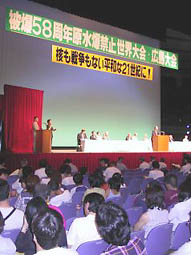 The Japan Congress Against A- and H-Bombs (Gensuikin) National Conference opened its Hiroshima World Conference Against Atomic and Hydrogen Bombs for the 58th anniversary of the atomic bombing on August 4 at the Hiroshima Prefectural Gymnasium, Naka-ku, Hiroshima. The main appeals were for stronger efforts to counter recent shifts in US nuclear strategy and find peaceful resolutions to the problem of North Korea's nuclear weapons program.
The Japan Congress Against A- and H-Bombs (Gensuikin) National Conference opened its Hiroshima World Conference Against Atomic and Hydrogen Bombs for the 58th anniversary of the atomic bombing on August 4 at the Hiroshima Prefectural Gymnasium, Naka-ku, Hiroshima. The main appeals were for stronger efforts to counter recent shifts in US nuclear strategy and find peaceful resolutions to the problem of North Korea's nuclear weapons program.
Approximately 4,500 people participated in a moment of silence for the victims of the atomic bomb and all wars. Shigetoshi Iwamatsu, chairman of the meeting's executive committee, said in his greeting, "The world faces a critical turning point. We must solve our problems not with weapons but with dialogue."
Hiroshima Mayor Tadatoshi Akiba, who attended as a guest, harshly criticized the US plan to develop new kinds of nuclear weapons. "The hibakusha have never sought revenge for the atomic bombing. They chose the path of reconciliation and have tried to sever the chain of violence." He issued a call for action to build peace through the UN.
Meanwhile, the 2003 World Conference against A & H Bombs led by the Japan Council Against A- and H-Bombs (Gensuikyo) was in its second day at the Hiroshima Welfare Annuity Hall, Naka-ku. On the 4th, about 300 people participated in a Special Session on Hibakusha Solidarity and related workshops.
Renata Izmailova, who lives near the nuclear test site of the former Soviet Union in Semipalatinsk, Kazafstan and who was born with skeletal abnormalities, emphasized, "The mere existence of nuclear weapons is deeply painful to hibakusha." The conference also demanded assistance for hibkusha living overseas and those who are suing to have their illnesses accepted as A-bomb related.
(Caption)Hiroshima Conference of Gensuikin calls for intensified efforts to ban nuclear weapons
    
|